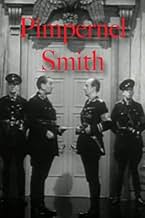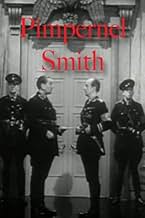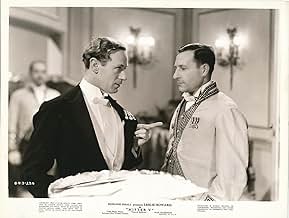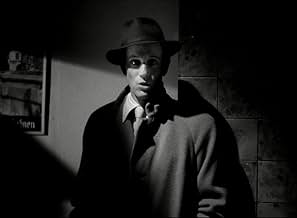Professor Horatio Smith, while seeming very unassuming, rescues victims of Nazi persecution during World War II.Professor Horatio Smith, while seeming very unassuming, rescues victims of Nazi persecution during World War II.Professor Horatio Smith, while seeming very unassuming, rescues victims of Nazi persecution during World War II.
- Awards
- 4 wins total
- General von Graum
- (as Francis Sullivan)
- Clarence Elstead
- (as Lawrence Kitchen)
Featured reviews
In the film, Professor Smith takes six students with him on an archaeological dig in Germany, presumably to find out whether or not there was an early Aryan civilization in Germany. Smith tries to convince Gestapo leader General Von Graum (Francis L. Sullivan) that he is just a learned professor, reading from The Jabberwocky by Lewis Carroll and telling him his theory that William Shakespeare was really the Earl of Oxford. Imagine that! The Professor's wit and wisdom are no match for the humorless Nazis and they seem to fall for each of the professor's tricks. Unfortunately, the Nazis are depicted not as mass murderers but only as bumbling clowns who speak English as well as Winston Churchill.
When Smith is wounded, the students catch on to what he is up to and agree to help him in his attempts to secure the release of pianist Sidimir Koslowski (Peter Gawthorne). In his clandestine cat and mouse game, he meets Koslowski's daughter Ludmilla (Mary Morris) who is working for the Nazis in order to save her father and the two form a bond. Howard's role as Professor Smith is one of his most acclaimed in a career that included roles as Ashley Wilkes in Gone With the Wind and Sir Percy Blakeney in The Scarlet Pimpernel. He had a great sense of style and screen presence and his death in 1943 on what was most likely an intelligence gathering mission for the British left the film industry bereft of one of its brightest stars.
If you do look at other comments, a few points: This film is *funny* too! It was not Leslie Howard's last film - 49th Parallel was made later the same year, and First of the Few in 1942, then he subsequently directed 'The Gentle Sex' and 'The Lamp still Burns' in 1943.
Howard was certainly on the Nazi's blacklist, but his death may have been an accident. He was returning from a 'lecture tour' (which was certainly propaganda and may well have had intelligence connotations) via Portugal, and the civilian plane he was on was shot down over the bay of Biscay. It's still not clear if this was an accident or a deliberate target, but if the latter, it's as likely that Howard's accountant, who bore a strong resemblance to Churchill, may have been the target.
Also, look out Violette Cunningham, the assistant in the cosmetic shop. She was Howard's last love - despite still being married to Ruth, he fell for Violette (who also appears in the German dinner scene in 'The First of the Few'). It broke his heart when she died, of cerebral meningitis, in 1942.
In The Scarlet Pimpernel Howard is a Georgian fop as his cover for the dashing, unknown, and elusive pimpernel. Substitute fop for tweedy as he's now an Oxford archeology professor and his cover is a beaut.
One of the Nazi Aryan racial vanities was that way back in the day there was an Aryan civilization. Being the archaeologist he is, Howard's cover is that he's in Germany on a dig, looking for evidence of that selfsame civilization. He even brings along several students as part of the cover.
In one scene Howard is wounded when he's disguised as a scarecrow and a Nazi guard shoots at it to make a point. That does lead to him being found out by his students, one of them being David Tomlinson, later the father in Mary Poppins. To a man, they all decide to stay and help him with his work.
Howard's a bachelor here so he doesn't have wife Merle Oberon and her family dirty laundry to compromise him as he did in The Scarlet Pimpernel. Here he's dealing with Mary Morris who is collaborating with the Nazis to keep her musician father, Peter Gawthorne alive.
Taking the place of Howard's relentless foe Chauvelin as played by Raymond Massey is Francis L. Sullivan as General Von Graum of the Gestapo. Sullivan is a favorite character actor of mine and a joy to watch in any film he does whether a good guy or the baddest of bad guys as he is here.
Leslie Howard directed this film himself and it's interesting to speculate had he survived World War II whether he would have done more work behind rather than in front of the camera. In directing Pimpernel Smith, he certainly had the advantage of knowing his character well.
And you shouldn't pass up an opportunity to get to know him too.
Albeit, very light fair, films like this were more to entertain and keep spirits high in not so certain times. The horrors of war can be looked back upon, but to push onward, the propaganda of the day was to show the enemy as almost comical foes, outwitted by the ever sensible Englishman. Leslie Howard plays this role beautifully and it remains one of my favorite performances by him...
Did you know
- TriviaOne of the earliest movies to openly and unflinchingly discuss Nazi labor, concentration, and death camps.
- GoofsAt the reception in the English embassy, Professor Smith misquotes Lewis Carroll's Jabberwocky. He mispronounces "borogoves" in the third line of the poem as "borogroves".
- Quotes
General von Graum: But we have one problem. "To be or not to be?" as our great German poet said.
Professor Horatio Smith: German? But that's Shakespeare.
Professor Horatio Smith: But you don't know?
Professor Horatio Smith: Why, I know it's Shakespeare. I thought Shakespeare was English.
General von Graum: No, no, no. Shakespeare is a German. Professor Schuessbacher has proved it once and for all.
Professor Horatio Smith: Oh dear, how very upsetting. Still, you must admit that the English translations are most remarkable.
General von Graum: Good night.
Professor Horatio Smith: Good night. Good night. "Parting is such sweet sorrow."
General von Graum: What is that?
Professor Horatio Smith: One of the most famous lines in German literature.
- Crazy creditsImmediately following the opening credits: "The tale we are about to unfold to you is a fantasy. None of its characters are living persons. But it is based on the exploits of a number of courageous men who were and are still risking their lives daily to aid those unfortunate people of many nationalities who are being persecuted and exterminated by the Nazis. To these champions of freedom this story is dedicated."
- Alternate versionsThis film was cut and retitled 'Mister V' for its first American release in the early 1940s. Some versions censor the response from Hugh McDermott's character "I'd do my damndest..." in response to a question posed by Leslie Howard's character at a table in a café.
- How long is Mister V?Powered by Alexa
Details
- Release date
- Country of origin
- Languages
- Also known as
- Mister V
- Filming locations
- D&P Studios, Denham, Uxbridge, Buckinghamshire, England, UK(as D & P Studios Denham . . . England)
- Production company
- See more company credits at IMDbPro
- Runtime
- 2h(120 min)
- Color
- Aspect ratio
- 1.37 : 1
































